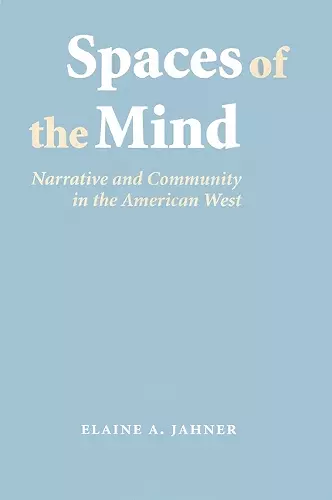Spaces of the Mind
Narrative and Community in the American West
Format:Paperback
Publisher:University of Nebraska Press
Published:1st May '08
Currently unavailable, and unfortunately no date known when it will be back

Reveals how both immigrant European and modern Native communities and individuals use oral and written narratives to define and centre themselves in time and space. This work provides a fresh understanding of Western literature and culture, and encourages a reconsideration of the formation and modern character of the American West.Spaces of the Mind reveals how both immigrant European and modern Native communities and individuals use oral and written narratives to define and center themselves in time and space. Elaine A. Jahner skillfully weaves together years of fieldwork among the Standing Rock Sioux in North Dakota, her own memories of growing up in a German-Russian town across the Missouri River from the Standing Rock Sioux, and an illuminating set of narrative concepts. Spaces of the Mind proposes a theory of cognitive style that emphasizes the ways in which distinct cultural identities are expressed through the structure of a narrative and the unfolding of its performance, telling, or reading. Themes of creativity and survival amid loss pervade the stories told by Natives about themselves and their past when discussing the inundation of the original Standing Rock Sioux village during the Oahe Dam construction in the 1950s. Immigrant Germans and Alsatians struggled to reconcile the hardships of the northern Plains with what they left behind in the Old World, and the narratives of a German-Russian community reflect and encourage survival in the face of transition. Jahner also studies how two prominent novelists—James Welch, a member of the Blackfeet community, and Mildred Walker, who left her native New England for the West— perceive a single landscape, the state of Montana, and how it has influenced their thought and narratives. Spaces of the Mind provides a fresh understanding of Western literature and culture, encourages a reconsideration of the formation and modern character of the American West, and contributes to a fuller appreciation of the significance of narrative.
“Spaces of the Mind pioneers a theory and a methodology that could prove very useful in the analysis of narrative in general and Native American oral narrative in particular provided that those who use the book realize the problem of data collection and are careful to document and situate their own data for research applications.”—Studies in American Indian Literatures
“Scholars of rhetoric and language, spatial theory, and social identity should find value in [this] attempt to explore cultural continuity through the structure of narrative.”—John Herron, Western Historical Quarterly
“Storytelling as survival is at the core of Elaine A. Jahner’s sophisticated Spaces of the Mind: Narrative and Community in the American West. . . . Her claim that narrative is the key to the way in which reality is—literally—socially constructed, seems relevant to the questions and aims of other westernists. Moreover, her focus on stories told by the putative historical losers rather than the winners accords with the New Western emphasis on nonheroic western narrative. . . . Approaching [James] Welch and [Mildred] Walker with the idea that stories are not only about, but are themselves agents of survival, she finds that both the novelists import storytelling styles and motifs from the repertory of the communities represented.”—Nina Baym, American Literary History
“[Jahner] has threaded together the insights of half a dozen disciplines to reveal the ways in which narratives encode the most fundamental meanings of individuality and community and what narratives can tell us about humanity writ large.”—Raymond J. DeMallie, author of The Sixth Grandfather: Black Elk's Teachings Given to John G. Neihardt
"[Jahner's] critical discussion of the Welch novels benefits from her knowledge of Native American myth and reaches the level of exquisite analysis, offering proof of her method and a model for the analysis of narrative literature invoking cultural continuity. She was a gifted writer and a master/mistress of the postmodern sentence." —Beverly Stoeltje, Journal of Folklore Research
ISBN: 9780803218338
Dimensions: unknown
Weight: 335g
212 pages